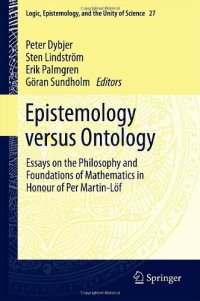
Ebook: Epistemology versus Ontology: Essays on the Philosophy and Foundations of Mathematics in Honour of Per Martin-Löf
- Genre: Mathematics // Logic
- Tags: Logic, Mathematical Logic and Foundations, Epistemology, Ontology, History of Mathematical Sciences
- Series: Logic Epistemology and the Unity of Science 27
- Year: 2012
- Publisher: Springer
- Language: English
- pdf
This book brings together philosophers, mathematicians and logicians to penetrate important problems in the philosophy and foundations of mathematics. In philosophy, one has been concerned with the opposition between constructivism and classical mathematics and the different ontological and epistemological views that are reflected in this opposition. The dominant foundational framework for current mathematics is classical logic and set theory with the axiom of choice (ZFC). This framework is, however, laden with philosophical difficulties. One important alternative foundational programme that is actively pursued today is predicativistic constructivism based on Martin-Löf type theory. Associated philosophical foundations are meaning theories in the tradition of Wittgenstein, Dummett, Prawitz and Martin-Löf. What is the relation between proof-theoretical semantics in the tradition of Gentzen, Prawitz, and Martin-Löf and Wittgensteinian or other accounts of meaning-as-use? What can proof-theoretical analyses tell us about the scope and limits of constructive and predicative mathematics?
This book brings together philosophers, mathematicians and logicians to penetrate important problems in the philosophy and foundations of mathematics. In philosophy, one has been concerned with the opposition between constructivism and classical mathematics and the different ontological and epistemological views that are reflected in this opposition. The dominant foundational framework for current mathematics is classical logic and set theory with the axiom of choice (ZFC). This framework is, however, laden with philosophical difficulties. One important alternative foundational programme that is actively pursued today is predicativistic constructivism based on Martin-Löf type theory. Associated philosophical foundations are meaning theories in the tradition of Wittgenstein, Dummett, Prawitz and Martin-Löf. What is the relation between proof-theoretical semantics in the tradition of Gentzen, Prawitz, and Martin-Löf and Wittgensteinian or other accounts of meaning-as-use? What can proof-theoretical analyses tell us about the scope and limits of constructive and predicative mathematics? Introduction.- On the Philosophical Work of Per Martin-Löf: Göran Sundholm.-Notes on the contributors.- Part 1. Philosophy of Logic and Mathematics.- Chapter 1. Kant and Real Numbers: Mark van Atten.- Chapter 2. Wittgenstein's Diagonal Argument: A Variation on Cantor and Turing: Juliet Floyd.- Chapter 3. Truth and Proof in Intuitionism: Dag Prawitz.- Chapter 4. Real and Ideal in Constructive Mathematics: Giovanni Sambin.- Chapter 5. In the Shadow of Incompleteness: Hilbert and Gentzen: Wilfried Sieg.- Chapter 6. Evolution and Logic: Jan Smith.- Chapter 7. The “Middle Wittgenstein” and Modern Mathematics: Sören Stenlund.- Chapter 8. Primitive Recursive Arithmetic and Its Role in the Foundations of Arithmetic: historical and Philosophical Reflections: William Tait.- Part 2. Foundations.- Chapter 9. Type Theory and Homotopy: Steve Awodey.- Chapter 10. A Computational Interpretation of Forcing in Type Theory: Thierry Coquand; Guilhem Jaber.- Chapter 11. Program Testing and the Meaning Explanations of Intuitionistic Type Theory: Peter Dybjer.- Chapter 12. Normativity in Logic: Jean-Yves Girard.- Chapter 13. Constructivist versus Structuralist Foundations: Erik Palmgren.- Chapter 14. Machine Translation and Type Theory: Aarne Ranta.- Chapter 15. Constructive Zermelo-Fraenkel Set Theory, Powerset, and the Calculus of Constructions: Michael Rathjen.- Chapter 16. Coalgebras as Types determined by their Elimination Rules: Anton Setzer.- Chapter 17. Second Order Logic, Set Theory and Foundations of Mathematics: Jouko Väänänen.